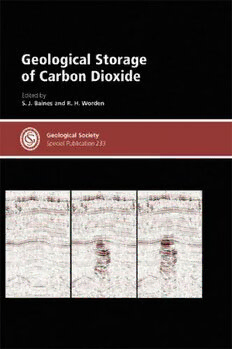
Geological Storage of Carbon Dioxide (Geological Society of London Special Publication No. 233) PDF
262 Pages·2004·42.625 MB·English
Most books are stored in the elastic cloud where traffic is expensive. For this reason, we have a limit on daily download.
Preview Geological Storage of Carbon Dioxide (Geological Society of London Special Publication No. 233)
Description:
Carbon dioxide (CO2) is the main compound identified as affecting the stability of the Earth's climate. A significant reduction in the volume of greenhouse gas emissions to the atmosphere is a key mechanism for mitigating climate change. Geological storage of CO2, or the injection and long-term stabilization of large volumes of CO2 in the subsurface in saline aquifers, in existing hydrocarbon reservoirs or in unmineable coal seams, is one of the more technologically advanced options available. A number of studies have been carried out and are reported here. They are aimed at understanding the safety, physical and chemical behaviour and long-term fate of CO2 when stored in geological formations. Until efficient, alternative energy options can be developed, geological storage of CO2, the subject of this volume, provides a mechanism to reduce carbon emissions significantly whilst continuing to meet the global demand for energy. Also available: The Future of Geological Modelling in Hydrocarbon Development - Special Publication no 309 - ISBN 1862392668 Underground Gas Storage: Worldwide Experiences and Future Development in the UK and Europe - Special Publication no 313 - ISBN 1862392722 The Geological Society of LondonFounded in 1807, the Geological Society of London is the oldest geological society in the world, and one of the largest publishers in the Earth sciences.The Society publishes a wide range of high-quality peer-reviewed titles for academics and professionals working in the geosciences, and enjoys an enviable international reputation for the quality of its work.The many areas in which we publish in include:-Petroleum geology-Tectonics, structural geology and geodynamics-Stratigraphy, sedimentology and paleontology-Volcanology, magmatic studies and geochemistry-Remote sensing-History of geology-Regional geology guides
See more
The list of books you might like
Most books are stored in the elastic cloud where traffic is expensive. For this reason, we have a limit on daily download.
